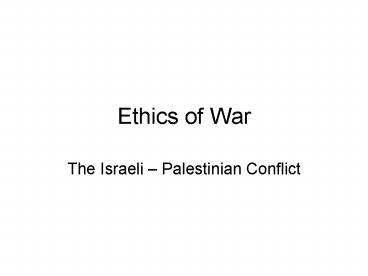Ethics of War - PowerPoint PPT Presentation
1 / 7
Title:
Ethics of War
Description:
Ethics of War The Israeli Palestinian Conflict Basics of the Conflict The Pro-Israel camp generally base their arguments on the following principles: a) Israel is ... – PowerPoint PPT presentation
Number of Views:99
Avg rating:3.0/5.0
Title: Ethics of War
1
Ethics of War
- The Israeli Palestinian Conflict
2
Basics of the Conflict
- The Pro-Israel camp generally base their
arguments on the following principles a) Israel
is the historical "homeland" of the Jewish
peoples who have lived there continuously since
biblical times. b) Many Jews believe that they
deserve a "Jewish" state because of historical
injustices, such as the Holocaust, and because
they have international support and recognition
through the U.N. c) The majority of Israelis
support a "two-state" solution, creating a
Palestinian state alongside Israel in Gaza and
the West Bank. d) Other Israelis support the
idea of "one-state", either by annexing all
occupied territories into the Jewish state (far
right view), or incorporate the occupied
territories into one secular democratic state
with equal rights for all (far left view).
- The Pro-Palestinian camp generally base their
arguments on the following principles a) The
Palestinian people have lived in the area of
Israel/Palestine since biblical times. They see
most Israeli Jews as foreign colonizers who began
arriving within the last 100 years. b)
Palestinians consider themselves a national
entity, deserving of the rights of all nations,
including a Palestinian state. c) Many Muslim
Palestinians and their supporters see the land as
Islamic holy land, and are strictly opposed to
non-Muslims owning and establishing a state on
Muslim land. d) Palestinians vary widely in what
they see as a just solution to the conflict. They
include the total destruction of Israel a
"bi-national" or "one-state" solution and a
"two-state" solution.
3
Purchasing the Land
- Before 1880, 10,000 Jews lived in Israel as
Dhimmi - From 1878 to 1908 Jews purchased from rich
landowning effendis 400,000 dunams in Israel,
about 1.5 of the land of Israel. Ottomans
resisted Jewish immigration but Jews bribed their
way in. - More purchased in 20s and 30s
4
Jewish Arab Population
5
- Stephen P. Halbrook, PhD, JD, Virginia State Bar
Attorney, in a 1981 Journal of Libertarian
Studies article titled "The Alienation of a
Homeland," wrote - "As for the Jews right to 'return' to Israel
because they populated the area two thousand
years ago, this reasoning would vindicate much
more strongly the right of Palestinian Arabs to
return to their homeland of only thirty years
ago."
6
- Jacob Tovy, PhD, Research Fellow at the
University of Haifa, in a Spring 2003 Middle East
Quarterly essay titled "Negotiating the
Palestinian Refugees," wrote the following - "Israel, the Palestinians argued, bore full
responsibility for the creation of the refugee
problem because its armed forces had carried out
a systematic, planned campaign to expel the
Palestinians during the 1948 war. The
Palestinians then invoked Article 11 of U.N.
Resolution 194 from December 1948, which, by
their reading, required Israel to allow all Arab
refugees interested in returning and living in
peace alongside their Jewish neighbors to do so
as soon as possible and to compensate those
refugees who were not interested in returning for
their abandoned property. The Palestinians
claimed that this resolution gave every single
refugee, and also every refugee's descendant, the
right to return (what they called 'the right of
return') to the place he or she left as a result
of the war.
7
- Israel, on the other hand, rejected (as it has
done since 1949) any possibility that a
significant number of Palestinian refugees might
be permitted to return to places within its
pre-1967 boundaries. Israel's representatives
refused to admit any responsibility for the
genesis of the refugee problem, arguing that it
was created because of the decision by the Arab
states and the Palestinians to take military
action in breach of the U.N. partition resolution
of November 1947, which called for the
establishment of two states in Palestine Jewish
and Arab. This policy of the Arab states
precipitated the 1948 war that created the
problem in the first place. Israel argued that
any significant return of refugees would
undermine the Jewish-Zionist character of the
state, endanger its security, and subvert its
economy."































